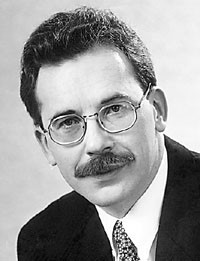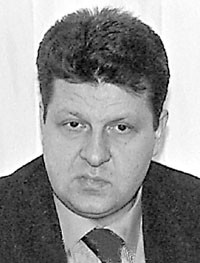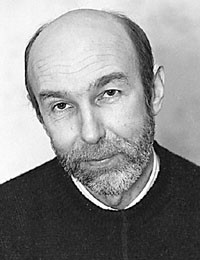There is a kind of lull atop our political Olympus, most likely due to the New Year [and Christmas festivities]. Yet our beloved Socialist comrades decided to remind us of their precious existence. A couple of days ago I opened my mailbox and found a printed sheet, a special issue of their Tovarysh [Comrade]. The sheet was titled Maidan [Square] and was in Ukrainian (it always is; Tovarysh is not published in Russian — Ed.), a print product of that scandalous party, of course. Thank God, the rest of the parties (107 in all!) sent me nothing, for I would have to hire a dump truck to get rid of it all.
The word maidan, a town square, reminded me of that party’s vocabulary, mostly consisting of expletives one can hear in a market square, and of Aleksandr Pushkin’s poem titled Ex Ungue Leonem: “So what? Neither I nor that clown in the square Could make secret our antics; He recognized me for what I was, seeing my claws. And I recognized him by his ears.”
You have to give it to the organizers of the action in Independence Square. For some time they kept this society spellbound by their slogans and efforts, but then we lit the lights on our trees and started trying to figure out what had actually happened.
Our top political leaders might be bad, they are not usurpers, in most cases just people like you and I as well as those who were elected by you and me, meaning that we will replace them when the time comes.
Maybe we made a bad choice in voting for them, but at the time that choice corresponded to the principles and procedures of our constitutional order — which, incidentally, makes it possible for us to call for improvements in those very procedures and to look for better candidates. The proof is that special Tovarysh issue.
Also, that sheet reminded me of the adage about every people being ruled by the government it deserves. Indeed, our president is just like us and we like him. Is he really our president?
As for that multitude of political parties, they could come up with some [constitutional] amendments or a law providing for the replacement of top executives in case they discredit themselves, and, of course, defining the appropriate legal procedures. They also could work out new programs for the development of Ukraine and offer the names of people who could be put in charge. Now this would be real democracy, but what we saw on Independence Square was an outburst of ochlocracy.
One could understand it if done by people lacking in education and having to do backbreaking toil for a living. But the action was led by students. What did those young people learn in school and are now learning at their colleges and universities? Or were they following in the footsteps of the Russian intelligentsia that made all those revolutions, eventually to be shot down by one? Apparently, what is at stake is not a group of so many individuals, but the entire political system.
Also, is it not as clearly apparent that presidents and people’s deputies can exist for so many years, but Ukraine must exist for centuries on end?
After all, what do we want from the president? Is not all this din another manifestation of our profoundly Soviet mentality? Can we really expect the president to build a happy and prosperous country for us, while we sit and watch, waiting for him to stumble and fall?
We have to face it. In a truly democratic country people actually do not care about those in power (despite all those signs and gestures of respect for appearance sake); they just each try to do their job well, mentally patting their president on the back, being on a first name basis with him.
I remember a story I heard from a man who was, for the first time in his life, appointed leader of a hiking team. He was nervous and not certain he would measure up. As it turned out, he need not have worried. Every member of the team knew exactly what he or she had to do, putting up tents, collecting firewood, cooking, etc.
That is precisely what we should all do now, get back to work. The students should get back to their classrooms and books. All such free Cossack practices dating from the seventeenth century, and repeated in the twentieth, bode us no good. We have already known Ruin and genocide.
The trick is not to collect central square orators but to build an economic and political system where each can care for himself and all would benefit from this.
What we badly need is understanding of what must be done for the good of our fatherland and what so many of us unfortunately lack. Or perhaps love for the fatherland is also Mr. President’s prerogative?
And the nerve of those speaking “on behalf of the people” that’s more like boorishness! Who gave all those youngsters, even if numbering several hundred, the right to cancel a choice made by the millions that cast their votes for the current President? And, incidentally, who do they propose instead?
Personally, I am for somebody like Hetman Pavlo Skoropadsky in terms of origin, education, and even stature. What he did for Ukrainian culture in half a year is more than both our Presidents have managed over the past decade. Yet he was toppled, replaced by the Directory led by Symon Petliura. And what did Petliura’s Directory accomplish?
I am also surprised at what our media are doing, pretending to adhere to world standards. They focus on scandals and deviant, meaning they are consciously or unconsciously giving them publicity. And not a word is heard about all those working hard to pay off wage, salary, and pension arrears. Is this not interesting?
So our heroes sleep on granite. Yet hikers and mountain climbers have to sleep on glaciers many kilometers deep, for otherwise they will never get to the top, so what? They would consider sleeping on granite by a hotel sheer foppery, dear squires of the square!
No, we maintain the established order and improve (reform) step by step and let others on other continents go about their revolutions. We have Western experience — and people live far better in the West than we do here — which shows that this strategy is the best we can have.
COMMENTARIES
Volodymyr CHEMERYS, leader of the Ukraine without Kuchma Action:
Our action is perfectly in accordance with Article 39 of the Constitution of Ukraine which says that we have a right to voice our protest. It is a very important right, practiced in all democratic countries. I think that having this right in Ukraine is quite an achievement. I should remind you that the US Constitution provides for the right of the people to rebel (no, our consultant assures us that it does not, but it does protect what this gentleman’s group has limited itself to thus far — Ed.). As for our demands, we want the president legally replaced. There are impeachment procedures and they are mentioned in the Constitution, but there is no law on impeachment. The president vetoed the bills on the president and on interim committees of inquiry. Under the circumstances Verkhovna Rada is practically unable to override such vetoes. We demanded cancellation of the veto power and have told the president so. I think that those scolding us for the absence of legislative procedures are actually addressing the president. As for the state system, I believe that the longer this regime remains in power, the sooner we will lose our statehood. Incidentally, it was interesting to watch the president fly to Moscow as soon as the scandal began.
As for our further actions, after I saw people’s response in the street and felt their support, I think that the president can be removed from office. Also, public response to the latest developments in Ukraine is very meaningful. It shows that our people is not totally amorphous. Of course, everything will depend not on the regime’s image, but on whether or not we can change the system. This is our main objective. We have to change the political, economic, and social relationships in this country. We have done a great deal, expanding the scope of the freedom of expression; now we can discuss things people were afraid to talk about before. Today, the more newspapers are disseminated by political parties, the more the citizens will benefit; people will find making their choice easier. Other democracies across the world were formed using actions as strong as ours. Remember what happened in Prague, Berlin, or elsewhere? This society has accumulated a protest potential; people are demanding a better life. I am also very glad that our action has been kept within the law. It had to take place. If we didn’t start it, others would have. I think that Ukraine needs a revolution, but I must say that this revolution can be accomplished using different methods. Revolution does not necessarily means barricades and gunshots. It can take place by means of rallies and marches, or even without them. The more peaceful it is kept in Ukraine, the better off we all will be, but this society needs a revolution.
Prof. Serhiy TELESHUN, President, Spivdruzhnist [Commonwealth] Foundation:
The way things are now, the Gongadze case is in the eyes of many an example of negative energy discharge against the institutions of power. A positive aspect is that the regime may become more public, dynamic, and reasonable primarily due a tender of ideas that can implement it as an institution securing the activity of the whole nation. Another positive aspect is the democratic character of the ongoing process. Many politicians have started voicing their actual views — in other words, they turned out not as stupid as we thought they were; they have their positions.
As for the interview with Major Melnychenko, I have said that this case will take quite some time. Not good for the opposition, while the powers that be could, of course, sweep the problem under the rug. Yet the whole thing is a political abscess, it is swelling and the head could rupture at the worst possible moment. For the opposition and the regime, New Year and Christmas were just a time-out in the conflict. I am sure that the man who made an archive of the president’s conversations (by taping or writing them down) will continue supplying information as the need arises, so as to further attract public attention and sharpen the conflict of interests. We already have an atmosphere of distrust in the top echelons of power. This is very dangerous, for example, for the parliamentary majority.
The Ukraine without Kuchma campaign has been a trial balloon, a feeler put out by opposition politicians. It carried out its mission at the first stage, drawing worldwide attention, dividing the Ukrainian citizenry politically and psychologically into those who believe and those who don’t. I know many at the head of the action. They are stubborn and they can’t back down; they have to go all the way to the logical end. And the logical end could be anything. The action organizers will remain politicians for as long as the action is underway. If they lose they will have a very hard time regaining their political status quo. If the action amounts to nothing and the trial ends in a compromise, both sides will have to step down. Today, they are a locomotive for other political forces, and I suspect that they are not so sure that their demands will be met, but they are satisfied with the situation at the moment.
Each of the participants in the process has to get his dividends: both the regime’s supporters and opponents; they are using the situation to strengthen their own positions and step up their activities.
Serhiy MAKEYEV, Ph.D. in sociology, Institute of Sociology, Ukrainian National Academy of sciences:
I don’t think that the conflict will undergo any radical changes after Radio Liberty’s interview with Mykola Melnychenko. Rather, the process is likely to acquire certain features to make it complete. There is a certain pattern of relationships between certain executive power structures and citizens, which I believe did actually trigger the conflict. First, the branches of government were increasingly less sensitive to people’s needs. In the Gongadze case the authorities showed that the could openly ignore those needs. The journalist reported that someone was following him. In other words, he asked for help and never got any. And the same happened when the public demanded quicker forensic examination of the body discovered at Tarashcha.
Second, I don’t know whether the Ministry of Internal Affairs is involved in or with the journalist’s abduction, but it’s perfectly clear that this ministry can endanger our rights and freedoms by just staying inactive. Third, I think that the situation allowed the authorities to feel more or less secure, that they could expect to avoid punishment and didn’t have to assume any responsibility. Fourth, responding to such a reaction by certain authorities is possible only by resorting to some unconventional, even illegal measures. This is precisely what Major Melnychenko did. And such methods are the worst aspect of the situation. After his interview it is no longer a political scandal, but a conflict between several power structures and the people, unfolding against the background of total societal cynicism. I am sure there is a positive solution to the conflict and, as a Ukrainian citizen, I do hope that this solution will help purify the social atmosphere and establish a normal climate. It should stimulate positive changes in mass sentiments. And these sentiments are such as though we were in a state of undeclared war or an armed conflict with one another and with certain power centers, which is kept out of the public eye. The scope of the shadow economy testifies to the scope of this war. Everything would be much simpler if the hostilities involved only the regime, but this war is actually between our present and future. We pay few taxes if any, thus ruining our education, science, culture, and health care. I am afraid that this war will bring forth a generation of professional warriors turned against the very foundations of social solidarity, warriors seeing no alternative. Thus, settling this scandal would be an impetus to invigoration and sublimation. The politicians drawn into this conflict must realize that the stakes are too high, because the point in question is the social recuperation of the nation.
Concerning the Ukraine without Kuchma action, any clean hands in terms of methods is out of the question. Another thing, frankly speaking, is that we as citizens have very few ways to pressure the regime or make it hear our needs and expectations. It is either writing letters or staging demonstration and support or protest rallies. Finally, it is going to extremes, like taking over official premises or other coercive actions, pressuring the system at the risk of one’s life, like hunger strikes, self-immolation, and so on. I do not support radical methods. In a normal society one does not have to risk one’s life to be heard. Such excessive measures are the direct result of the absolutely absurd situation we are now in.









